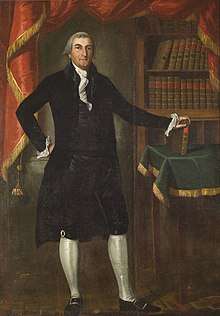Uriah Tracy
Uriah Tracy (February 2, 1755 – July 19, 1807) was an eighteenth-century American lawyer and politician from Connecticut. He served in both the House of Representatives and the Senate.
Uriah Tracy | |
|---|---|
 | |
| President pro tempore of the United States Senate | |
| In office May 14, 1800 – November 16, 1800 | |
| Preceded by | Samuel Livermore |
| Succeeded by | John E. Howard |
| United States Senator from Connecticut | |
| In office October 13, 1796 – July 19, 1807 | |
| Preceded by | Jonathan Trumbull, Jr. |
| Succeeded by | Chauncey Goodrich |
| Member of the U.S. House of Representatives from Connecticut's At-large congressional district | |
| In office April 8, 1793 – October 13, 1796 | |
| Preceded by | Zephaniah Swift |
| Succeeded by | Samuel W. Dana |
| Personal details | |
| Born | February 2, 1755 Franklin, Connecticut Colony, British America |
| Died | July 19, 1807 (aged 52) Washington, D.C., U.S. |
| Political party | Federalist |
| Alma mater | Yale University |
| Profession | Lawyer, Politician |
Biography
Tracy was born in Franklin in the Connecticut Colony. In his youth he received a liberal education.[1] His name is listed as amongst those in a company from Roxbury responding to the Lexington Alarm at the beginning of the American Revolutionary War. He later served in the Roxbury Company as a clerk[1]
Tracy subsequently graduated from Yale University where his contemporaries included Noah Webster in 1778. He was admitted to the bar in 1781 after which he practiced law in Litchfield for many years.[2] He served in the state legislature in 1788–1793, and in the United States House of Representatives from April 8, 1793– October 13, 1796, having been chosen as a Federalist.[3]
He resigned his seat when he was elected to the United States Senate in place of Jonathan Trumbull Jr., who had resigned.[4] Tracy served until the time of his death in Washington, D. C.. He has the distinction of being the first member of Congress interred in the Congressional Cemetery.[1] His descendants include the mathematician Curtis Tracy McMullen and the author Jeanie Gould.[5]
In 1803, he and several other New England politicians proposed secession of New England from the union due to growing influence of Jeffersonian democrats and the Louisiana Purchase which they felt would further diminish Northern influence.
His portrait, painted by Ralph Earl, is in the collection of the Litchfield Historical Society in Litchfield, Connecticut.
References
- "Eyewitnesses Interred or Memorialized in the Congressional Cemetery" (PDF). Congressional Cemetery. Archived from the original (PDF) on September 10, 2008. Retrieved July 25, 2008.
- "Uriah Tracy". Find A Grave. Retrieved January 1, 2013.
- "Sen. Uriah Tracy". Govtrack.us. Retrieved January 1, 2013.
- "Tracy, Uriah (1755-1807)". The Political Graveyard. Retrieved January 1, 2013.
- Tracy Genealogy
External links
- United States Congress. "Uriah Tracy (id: T000348)". Biographical Directory of the United States Congress.
- Portrait at the Litchfield Historical Society
- Uriah Tracy at Find a Grave
- The Political Graveyard
- Govtrack.us
| U.S. Senate | ||
|---|---|---|
| Preceded by Jonathan Trumbull, Jr. |
U.S. senator (Class 3) from Connecticut 1796–1807 Served alongside: James Hillhouse |
Succeeded by Chauncey Goodrich |
| U.S. House of Representatives | ||
| Preceded by Zephaniah Swift |
Member of the U.S. House of Representatives from Connecticut's at-large congressional district April 8, 1793 – October 13, 1796 |
Succeeded by Samuel W. Dana |
| Political offices | ||
| Preceded by Samuel Livermore |
President pro tempore of the United States Senate May 14, 1800 – November 16, 1800 |
Succeeded by John E. Howard |

